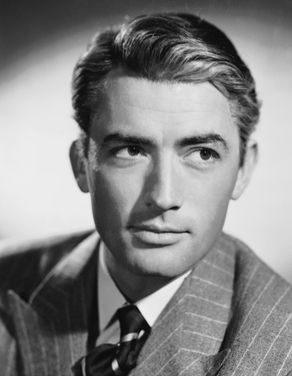
Gregory Peck
Active - 1944 - 2003 | Born - Apr 5, 1916 in La Jolla, CA | Died - Jun 12, 2003 in Los Angeles, CA | Genres - Drama, Western, Adventure, Film, TV & Radio [nf], History [nf] | Height: 6’ 3”
One of the postwar era’s most successful actors, Gregory Peck was long the moral conscience of the silver screen; almost without exception, his performances embodied the virtues of strength, conviction, and intelligence so highly valued by American audiences. As the studios’ iron grip on Hollywood began to loosen, he also emerged among the very first stars to declare his creative independence, working almost solely in movies of his own choosing. Born April 5, 1916, in La Jolla, CA, Peck worked as a truck driver before attending Berkeley, where he first began acting.
Peck was spotted by David O. Selznick, for whom he screen-tested, only to be turned down. Over the next year, he played a double role in The Willow and I, fielding and rejecting the occasional film offer. Finally, in 1943, he accepted a role in Days of Glory, appearing opposite then-fiancée Tamara Toumanova. While the picture itself was largely dismissed, Peck found himself at the center of a studio bidding war. He finally signed with 20th Century Fox, who cast him in 1944’s The Keys of the Kingdom - a turn for which he snagged his first of many Oscar nods.
With a string of hits to his credit, Peck made the decision to only work in films that interested him. He continued to appear as the heroic, larger-than-life figures in such films as Captain Horatio Hornblower R.N. (1951) and Moby Dick (1956). He worked with Audrey Hepburn in her debut film, Roman Holiday (1953). Peck finally won the Oscar, after four nominations, for his performance as lawyer Atticus Finch in To Kill a Mockingbird (1962). In the early 1960s he appeared in two darker films than he usually made, Cape Fear (1962) and Captain Newman, M.D. (1963), which dealt with the way people live. He also gave a powerful performance as Capt. Keith Mallory in The Guns of Navarone (1961), one of the biggest box-office hits of that year.
In 1967 Peck received the Academy’s Jean Hersholt Humanitarian Award. He was also been awarded the US Presidential Medal of Freedom. Always politically progressive, Peck was active in such causes as anti-war protests, workers’ rights and civil rights. He died in June 2003, aged 87.
Available Films:
Active - 1944 - 2003 | Born - Apr 5, 1916 in La Jolla, CA | Died - Jun 12, 2003 in Los Angeles, CA | Genres - Drama, Western, Adventure, Film, TV & Radio [nf], History [nf] | Height: 6’ 3”
One of the postwar era’s most successful actors, Gregory Peck was long the moral conscience of the silver screen; almost without exception, his performances embodied the virtues of strength, conviction, and intelligence so highly valued by American audiences. As the studios’ iron grip on Hollywood began to loosen, he also emerged among the very first stars to declare his creative independence, working almost solely in movies of his own choosing. Born April 5, 1916, in La Jolla, CA, Peck worked as a truck driver before attending Berkeley, where he first began acting.
Peck was spotted by David O. Selznick, for whom he screen-tested, only to be turned down. Over the next year, he played a double role in The Willow and I, fielding and rejecting the occasional film offer. Finally, in 1943, he accepted a role in Days of Glory, appearing opposite then-fiancée Tamara Toumanova. While the picture itself was largely dismissed, Peck found himself at the center of a studio bidding war. He finally signed with 20th Century Fox, who cast him in 1944’s The Keys of the Kingdom - a turn for which he snagged his first of many Oscar nods.
With a string of hits to his credit, Peck made the decision to only work in films that interested him. He continued to appear as the heroic, larger-than-life figures in such films as Captain Horatio Hornblower R.N. (1951) and Moby Dick (1956). He worked with Audrey Hepburn in her debut film, Roman Holiday (1953). Peck finally won the Oscar, after four nominations, for his performance as lawyer Atticus Finch in To Kill a Mockingbird (1962). In the early 1960s he appeared in two darker films than he usually made, Cape Fear (1962) and Captain Newman, M.D. (1963), which dealt with the way people live. He also gave a powerful performance as Capt. Keith Mallory in The Guns of Navarone (1961), one of the biggest box-office hits of that year.
In 1967 Peck received the Academy’s Jean Hersholt Humanitarian Award. He was also been awarded the US Presidential Medal of Freedom. Always politically progressive, Peck was active in such causes as anti-war protests, workers’ rights and civil rights. He died in June 2003, aged 87.
Available Films:
CAPE FEAR DAYS OF GLORY DUEL IN THE SUN GENTLEMAN'S AGREEMENT GUNFIGHTER, THE |
ONLY THE VALIANT SPELLBOUND TWELVE O'CLOCK HIGH VALLEY OF DECISION,THE |
Trivia:
Turned down Gary Cooper’s Oscar-winning role as Marshal Will Kane in High Noon (1952) because he felt the story was too similar to his The Gunfighter (1950). When the film proved to be a huge success Peck admitted he had made a mistake, though he said he didn’t believe he could have played the character as well as Cooper.
Turned down Gary Cooper’s Oscar-winning role as Marshal Will Kane in High Noon (1952) because he felt the story was too similar to his The Gunfighter (1950). When the film proved to be a huge success Peck admitted he had made a mistake, though he said he didn’t believe he could have played the character as well as Cooper.




